- Home
- Naguib Mahfouz
Palace of Desire tct-2 Page 10
Palace of Desire tct-2 Read online
Page 10
Fuad said somewhat plaintively, "My encounters with Narjis ended once she was forbidden to play outside."
Kamal asked him with interest, "Didn't that relationship trouble you, since you're a Believer?"
Lowering his eyes in embarrassment, Fuad answered, "Some things can't be helped". Then, as though to conceal his discomfort, he asked, "Will you really refuse to take advantage of this opportunity?"
"Absolutely!"
"Merely on religious grounds?"
"Isn't that enough?"
Fuad smiled broadly and commented, "You always try to bear intolerable burdens."
Kamal replied emphatically, "That's the way I am. There's no need for me to be any different."
They exchanged a long look, which expressed Kamal's determination and defiance and reflected both Fuad's desire not to quarrel and his smile, which was like the sun's fiery rays sparkling merrily on the water. Then Kamal continued: "In my opinion, lust is a base instinct. I hate the thought of surrendering to it. Perhaps it was implanted in us merely to inspire us to struggle against it and to seek to rise above it, so we'll be fit to ascend to the truly human rank. If I'm not a man, I'm a beast."
Fuad hesitated a little. Then he observed calmly, "I think it's not all bad, for it motivates us to get married and have children."
Kamal's heart pounded violently without Fuad being aware of it. Was this what marriage was all about? He knew it was a fact but felt perplexed that people could reconcile love and marriage. It was a problem he did not confront with his love, because marriage had always seemed, for more than one reason, beyond his highest hopes. /Jl the same, it was a problem requiring a solution. He could not imagine any felicitous link between himself and his beloved not based on her spiritual affection and on his ardent aspirations. It would resemble worship more than anything else. Indeed it would be worship on his part. What connection did marriage have to this?
"People who are really in love don't get married."
Fuad asked with astonishment, "What did you say?"
Even before Fuad's question, Kamal realized he had said something he did not intend to. For an awkward moment his confusion was apparent. He tried to remember Fuad's last words before this strange assertion had popped out. Although he had just heard them, it was with some effort that he recalled what Fuad had said about marriage and children. He decided to cover up his slip by adapting the meaning as best he could. So he said, "People who are really in love with ideals superior to life itself don't get married. That's what I meant to say."
Fuad smiled faintly — or perhapshe was trying not to laugh — but his eyes, like deep pools, betrayed none of his sentiments. He simply remarked, "These are serious matters. Talk about them now is premature. Everything in its own time."
Kamal shrugged his shoulders scornfully but confidently and said, "So let's postpone it and wait."
There was a mountain separating him from Fuad, but nonetheless they were friends. It was impossible to deny that the difference between them attracted him to Fuad, although it had repeatedly caused him anguish. Was it not time for him to go home? Solitude and communion with his soul called him. Thought of the diary slumbering in the drawer of his desk stirred the passions of his breast. A person exhausted from putting up with reality seeks relaxation deep inside himself.
"It's time to go home," he said.
78
The carriage made its way along the banks of the Nile until it stopped in front of a houseboat at the end of the first triangle of streets on the road to Imbaba. Al-Sayyid Ahmad Abd al-Jawad descended at once, followed immediately by Mr. Ali Abd al-Rahim. Night had fallen, and darkness blanketed everything. The only exceptions were the widely spaced lights shining from the windows of the houseboats and other vessels lined up along either shore of the river channel downstream from the Zamalek Bridge, and the faint glow of the village at the end of the road, like a cloud reflecting the brilliance of the sun in a sky otherwise dark and heavily overcast.
Al-Sayyid Ahmad was visiting the houseboat for the first time, although Muhammad Iffat had leased it for the last four years, dedicating it to the romantic escapades and parties al-Sayyid Ahmad had denied himself since Fahmy was slain. Ali Abd al-Rahim went ahead to show him the gangplank. When he reached the stairshe warned his friend, "The stairway is narrow and the steps are steep with no railing. Put your paw on my shoulder and come down slowly."
They descended cautiously as the sound of water lapping against the riverbank and the prow of the boat caressed their ears. At the same time their noses were stung by the rank odors of nearby vegetation mixed with the scent of the silt that the floods at the beginning of September were lavishly depositing.
As Ali Abd al-Rahim felt for the doorbell by the entrance, he remarked, "This is a historic evening in your life and ours: the night the old master returns. Don't you think so?"
Tightening his grip on his friend's shoulder, al-Sayyid Ahmad replied, "But I'm no old master. The oldest master was your father."
Ali Abd al-Rahim laughed and said, "Now you'll see faces you haven't glimpsed for five years."
As though wavering, al-Sayyid Ahmad remarked, "This doesn't mean that I'm going to alter my conduct or deviate from my principles". Then after a moment of silence he continued: "Perhaps … maybe …"
"If you leave a dog in the kitchen with a piece of meat, can you imagine him promising not to touch it?"
"The real dog was your father, you son of a bitch."
Mr. Ali rang the doorbell. The door was opened almost immediately by an aged Nubian servant who stepped aside to allow them to enter and raised his hands to his head in welcome. Once inside they made for the door on the left, which opened on a small vestibule lit by an electric lamp hanging from the ceiling. The walls on either side were decorated with a mirror beneath which a large leather armchair and a small table were placed. At the far end of the room there was another door, which was ajar. Through it could be heard the voices of the guests, and al-Sayyid Ahmad was deeply moved. Ali Abd al-Rahim shoved the door wide open and entered. Al-Sayyid Ahmad followed and had scarcely crossed the threshold when he found himself confronted by his friends, who rose and came forward to greet him joyfully. Their delight was so great it virtually leapt from their faces.
The first to reach him was Muhammad Iffat, who embraced him as he quoted from a popular song: "The beauty of the full moon is shining upon us."
Ibrahim al-Far cited another song title when he hugged him: "Destiny has brought me what I've longed for."
The men then stepped back to let him see Jalila, Zubayda, and a third woman, who stood two steps behind the others. He soon remembered that she was Zanuba, the lute player. Oh… his whole past had been assembled in a single setting. He beamed, although he appeared slightly embarrassed. Jalila gave a long laugh and opened her arms to embrace him as she chanted, "Where have you been hiding, my pretty one?"
When she released him, he saw that Zubayda was hesitating an arm's length away, although a happy light of welcome illuminated her face. He stretched his arm out to her and she squeezed it. At that same moment she arched her painted eyebrows reproachfully and, referring to yet another song, said in a tone not free of sarcasm, "After thirteen years…"
He could not help but laugh wholeheartedly. Finally he noticed that Zanuba had not budged. She was smiling shyly, as though she thought their past acquaintance too slight for her to be forward. He held his hand out and shook hers. To encourage and flatter her he said, "Greetings to the princess of lute players."
As they returned to their seats, Muhammad Iffat put his arm around Ahmad's and made his friend sit beside him. He laughingly asked, "Did you just happen to drop by or has passion caught hold ofyou?"
"Passion caught hold of me, so I just happened to drop by."
At first he had been blinded by the warmth of the reunion and the jests of his friends when they welcomed him. Now his eyes could take in his surroundings. He found himself in a room of medium size with walls and ceilin
gs painted emerald green. There were two windows facing the Nile and two on the street side of the boat. Although the windows were open, the shutters were closed. Hanging from the ceiling in the middle of the room was an electric lamp with a conical crystal shade, which focused the light on the surface of a low table holding the glasses and the whiskey bottles. The floor was covered with a carpet the same color as the walls. On each side of the room there was a large sofa divided in half by a cushion and covered with an embroidered cloth. The corners of the room were filled with pallets and pillows. Jalila, Zubayda, and Zanuba sat on the sofa farthest from the street, and three of the men on the one facing them. The pallets were strewn with musical instruments: lute, tambourine, drum, and finger cymbals. He took his time looking around. Then after sighing with satisfaction he said delightedly, "My God, my God, everything's so beautiful. But why don't you open the windows on the Nile?"
Muhammad Iffat replied, "They're opened once the sailboats stop passing. As the Prophet said, 'If you are tempted, conceal yourselves.'"
Al-Sayyid Ahmad quickly retorted with a smile, "And if you conceal yourselves, be tempted."
"Show us you're still as quick as you used to be," Jalila shouted as if challenging him.
He had intended his words to be nothing more than a joke. The truth was that he was anxious and hesitant about taking this revolutionary step and coming to the houseboat after the long period of self-denial he had observed. There was something more too. A change had taken place that he would have to unravel for himself. He would need to look closely and attentively. What did he see? There were Jalila and Zubayda, each of them as massively beautiful as the ceremonial camel when it set off for Mecca with the pilgrims. He had used that image to describe them in the old days. They had perhaps even added to their mass of fleshly charms, but something had come over them that was almost more easily perceived by his emotions than his senses. No doubt it was associated with the process of aging. Perhaps his friends had not noticed it since they had not been separated from the women as he had. Had he not been affected by age in much the same way? He felt sad, and his spirits flagged. A man's most telling mirror is a friend who returns after a long absence. But how could he pinpoint this change? Neither of the women had a single white hair, for no entertainer would ever allow her hair to turn white. And they had no wrinkles.
"Do you give up?" he asked himself. "Certainly not. Just look at those eyes. They reflect a spirit that's fading, no matter how they sparkle and flash. Fatigue disappears from sight momentarily behind a smile or a jest, but then its full truth is apparent. You can read in that look the obituary for their youth, a silent elegy. Isn't Zubayda in her fifties? And Jalila's several years older. She violently disputes that fact but will never be able to disprove it no matter how often she denies it."
There was a change in his heart too. He felt aversion and repulsion. It had not been that way when he arrived, for he had come in breathless pursuit of a phantom, which no longer existed. So be it. God forbid that he should willingly submit to defeat…. "Drink, let yourself be transported by the music, and laugh. No one will ever force you to do something you don't want."
Jalila said, "I didn't believe my eyes would ever see you again in this world."
He yielded to an overwhelming temptation to ask: "How do you find me?"
Zubayda intervened: "The same as ever. As big and strong as a camel. One white hair shows under your fez. Nothing more than that."
Jalila protested, "Let me answer, because he asked me". Then she told al-Sayyid Ahmad, "You look the way you always did.
But there's nothing strange about that. We're all still youngsters."
Al-Sayyid Ahmad discerned her goal. Trying to seem serious and sincere, he replied, "You two have only increased in beauty and good looks. I wasn't expecting this much."
Examining him with interest, Zubayda inquired, "What has kept you away from us all this time?" She laughingly advised him, "If your intentions were at all good, you could have had an innocent rendezvous with us. Can't we ever meet unless there's a bed beneath us?"
Waving his arm in the air to toss back the sleeve of his caftan, Mr. Ibrahim al-Far retorted, "Neither he nor we know how to have an innocent rendezvous with you."
Zubayda grumbled, "I seek refuge with God from you men. All you want a woman for is sex."
Jalila laughed out loud and commented, "Mother's pet, you should thank your Lord for that. Could you have grown so splendidly fat if you had not been content to profit from sex?"
Zubayda told her critically, "Don't interfere with my interrogation of the accused."
With a smile al-Sayyid Ahmad said, "I was sentenced to five years of innocence without labor."
Zubayda pounced on him again and said mockingly, "Alas, poor boy! You deprived yourself of every pleasure, all of them, poor baby, so that the only ones to enjoy were food, drink, music, humor, and staying out till daybreak, night after night."
He answered apologetically, "These things are necessary for a grieving heart, but the other ones …"
Zubayda gestured toward him as though to say, "You're hopeless!" Then she remarked, "So, I've learned now that you consider us worse than all the other sins and transgressions put together…."
As though remembering an important matter he had almost forgotten, Muhammad Iffat interrupted her by crying out, "Have we assembled from the ends of the earth just to talk? The glasses are staring down at us, but no one's paying any attention to them. Fill the glasses, Ali. Tune your instrument, Zanuba. And you, the accused gentleman, make yourself more comfortable. Do you think you're at school and can't remove any clothing? Take off your fez and cloak. Don't assume that your interrogation is over, but first all the court officials must get drunk. Then we can resume the interrogation. Jalila insisted that we shouldn't get intoxicated until 'the sultan of good times' arrived. At least that's what she said. This woman esteems you as highly as Satan does a chronic sinner. God's blessing on your relationship with her and hers with you."
Al-Sayyid Ahmad rose to slip out of his cloak, and Ali Abd al-Rahim went to serve as bartender, as usual. A few discordant whispers were emitted by the lute strings as they were being tested. Zubayda crooned gently. With her fingertips Jalila smoothed the strands of her hair and the neck of her dress where it fell between her breasts. Eyes watched Ali Abd al-Rahim's hands with longing as he filled the glasses. Al-Sayyid Ahmad sat down again with his legs tucked beneath him. His eyes wandered over the room and the people in it until they chanced to meet Zanuba's. A smiling look of recognition lit up their eyes. Ali Abd al-Rahim presented the first round of drinks. Then Muhammad Iffat said, "To good health and good love."
Jalila said, "To your return, Mr. Ahmad."
Zubayda said, "To right guidance when it follows error."
Al-Sayyid Ahmad said, "To those I love from whom I've been separated by grief."
They all drank. Al-Sayyid Ahmad raised his drink to his lips. Over the base of the glasshe could see Zanuba's face. He was touched by its freshness.
Muhammad Iffat told Ali Abd al-Rahim, "Time for the second round."
Ibrahim al-Far added, "And the third should follow immediately so we can lay the groundwork properly."
As he set to work Ali Abd al-Rahim observed, "A group's servant is their master."
Ahmad Abd al-Jawad found himself watching Zanuba's fingers as she tuned the lute strings. He wondered how old she was, estimating that she was between twenty-five and thirty. He also asked himself why she was present. Had she only come to play the lute or was her Aunt Zubayda preparing to launch her in this profitable career?
Mr. Ibrahim al-Far said that just looking at the water of the Nile made him seasick, and Jalila shouted at him that he had made his mother sick in his day.
Ali Abd al-Rahim asked, "If a woman as big as Jalila or Zubayda were thrown into the water, would she sink or float?"
Al-Sayyid Ahmad answered that she would float, unless there was a hole in her. He wondered what would happe
n if he felt tempted by Zanuba and told himself that at present it would be a scandal, after five glasses it would be awkward, but after a whole bottle it would become a duty.
Muhammad Iffat proposed they drink to the health of the nationalist leaders Sa'd Zaghlul and Mustafa al-Nahhas, who would be traveling at the end of the month from Paris to London for negotiations. Ibrahim al-Far suggested that they drink a toast to the Labour Party leader Ramsay MacDonald, a friend of the Egyptians.
Ali Abd al-Rahim asked what MacDonald had meant by saying he could solve the Egyptian problem before he finished drinking the cup of coffee he had in front of him.
Ahmad Abd al-Jawad answered that he meant it took an Englishman, on average, half a century to drink a cup of coffee.
Al-Sayyid Ahmad remembered how alienated he had felt by the revolution after Fahmy had been slain and how he had gradually returned to his original pro-nationalist feelings because of the respect and esteem people showered on him as the father of a martyr. In time, he had found that Fahmy's tragedy had even become a source of pride.
Jalila raised her glass in the direction of al-Sayyid Ahmad as she said, "To your health, my camel. I've often asked myself whether you had really forgotten us. But God knows I understood and prayed God would grant you endurance and consolation. Don't be surprised, for I'm your sister and you've been a brother to me."
Muhammad Iffat asked mischievously, "If you're his sister and he's your brother, as you claim, then should you two have done what you used to?"

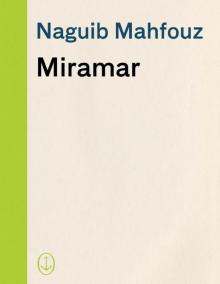 Miramar
Miramar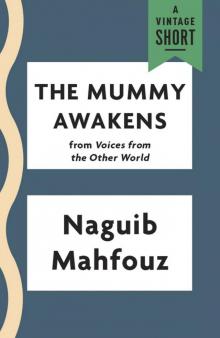 The Mummy Awakens
The Mummy Awakens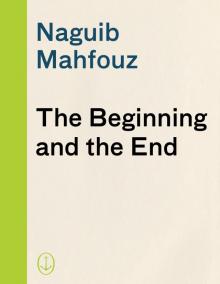 The Beginning and the End
The Beginning and the End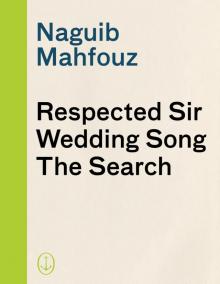 Respected Sir, Wedding Song, the Search
Respected Sir, Wedding Song, the Search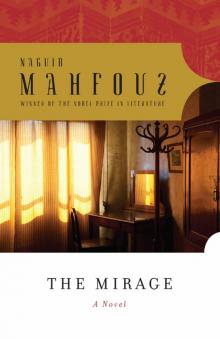 The Mirage
The Mirage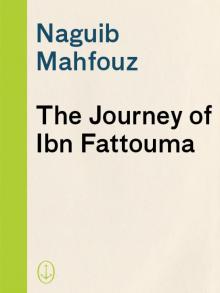 Novels by Naguib Mahfouz
Novels by Naguib Mahfouz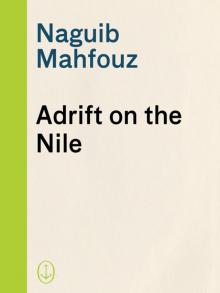 Adrift on the Nile
Adrift on the Nile Karnak Café
Karnak Café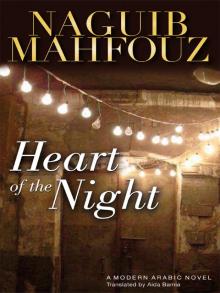 Heart of the Night
Heart of the Night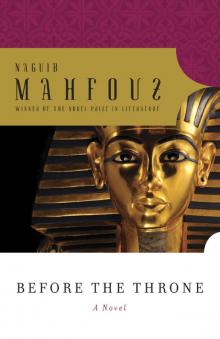 Before the Throne
Before the Throne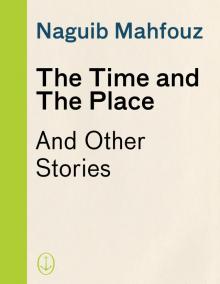 The Time and the Place: And Other Stories
The Time and the Place: And Other Stories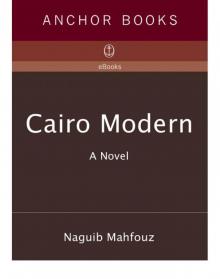 Cairo Modern
Cairo Modern Arabian Nights and Days
Arabian Nights and Days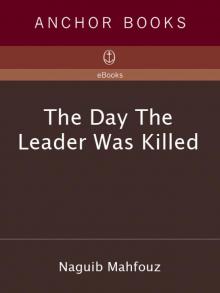 The Day the Leader Was Killed
The Day the Leader Was Killed Morning and Evening Talk
Morning and Evening Talk Three Novels of Ancient Egypt Khufu's Wisdom
Three Novels of Ancient Egypt Khufu's Wisdom Akhenaten: Dweller in Truth
Akhenaten: Dweller in Truth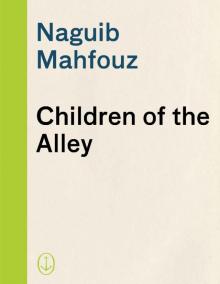 Children of the Alley
Children of the Alley Voices From the Other World
Voices From the Other World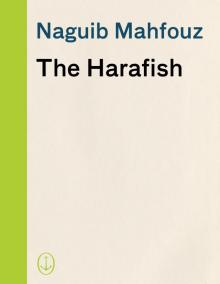 The Harafish
The Harafish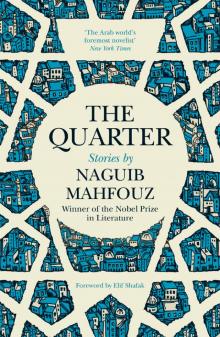 The Quarter
The Quarter The Seventh Heaven: Supernatural Tales
The Seventh Heaven: Supernatural Tales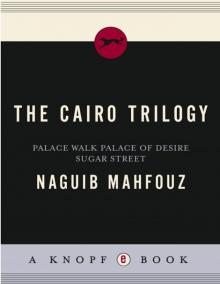 The Cairo Trilogy: Palace Walk, Palace of Desire, Sugar Street
The Cairo Trilogy: Palace Walk, Palace of Desire, Sugar Street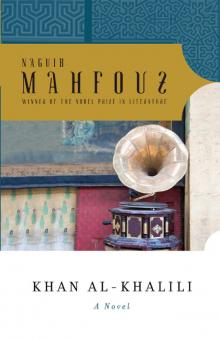 Khan Al-Khalili
Khan Al-Khalili Three Novels of Ancient Egypt Khufu's Wisdom, Rhadopis of Nubia, Thebes at War
Three Novels of Ancient Egypt Khufu's Wisdom, Rhadopis of Nubia, Thebes at War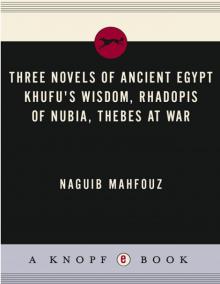 Three Novels of Ancient Egypt
Three Novels of Ancient Egypt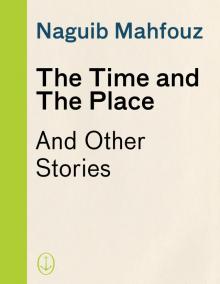 The Time and the Place
The Time and the Place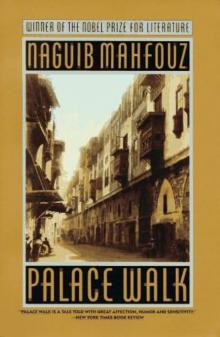 Palace Walk tct-1
Palace Walk tct-1 Akhenaten
Akhenaten The Seventh Heaven
The Seventh Heaven The Thief and the Dogs
The Thief and the Dogs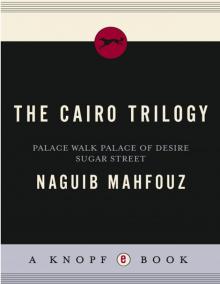 The Cairo Trilogy
The Cairo Trilogy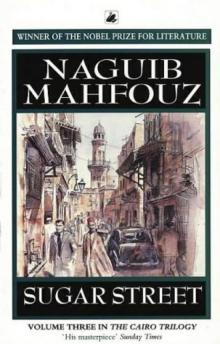 Sugar Street tct-3
Sugar Street tct-3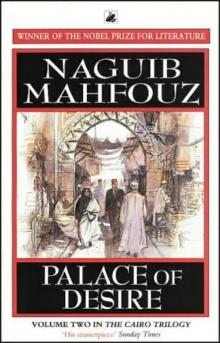 Palace of Desire tct-2
Palace of Desire tct-2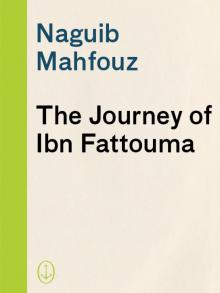 The Journey of Ibn Fattouma
The Journey of Ibn Fattouma